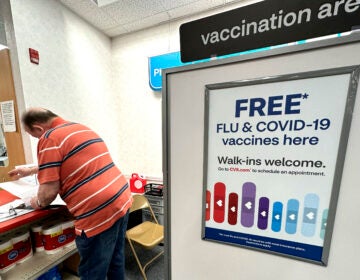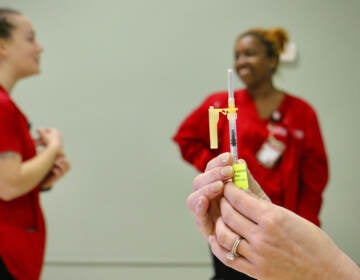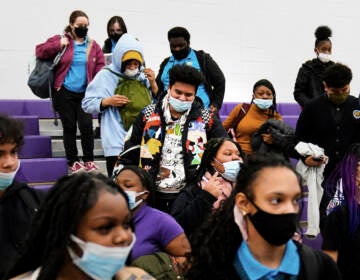Coronavirus update: N.J. promises crackdown on ‘stay-at-home’ scofflaws
Stiff penalties await individuals and businesses who violate New Jersey’s strict social distancing mandates, Attorney General Gurbir Grewal said.
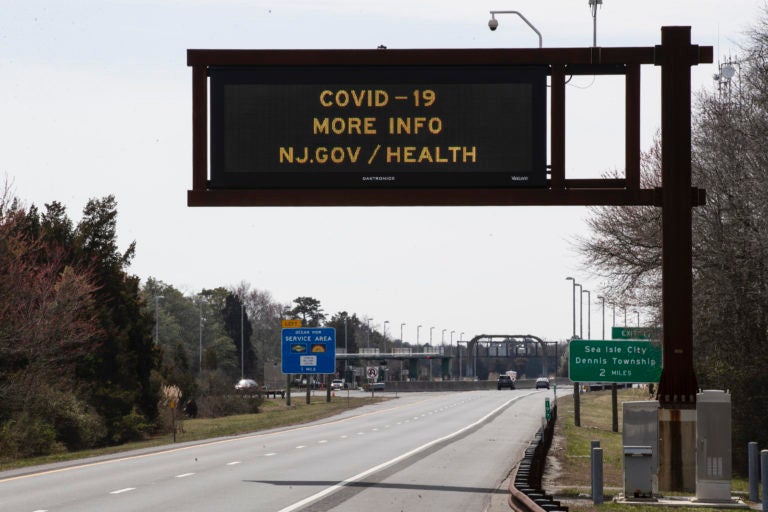
A notice is displayed above the lightly traveled Garden State Parkway in Ocean View, N.J., Wednesday, March 18, 2020. (AP Photo/Matt Rourke)
To date, there are 2,844 confirmed cases of COVID-19 in New Jersey, 479 in Pennsylvania and 68 in Delaware.
Updated 3:55 p.m.
8,000+ openings on N.J. jobs portal
In the face of what Gov. Phil Murphy on Monday called “enormous economic pain” caused by social distancing mandates, the state has set up a jobs and hiring portal to match residents with work opportunities.
“Critical businesses remain open and some of them are desperately seeking people to help them on the front lines of our response,” Murphy said. “By our tally, there are more than 8,000 available jobs, including grocery workers, warehouse and manufacturing distribution personnel and many others.”
Companies can also list openings through the site, which is maintained by the state Department of Labor and Economic Development Authority.
935 new cases and seven more deaths
The number of people who have tested positive for COVID-19 in New Jersey soared by 935 on Monday for a total of 2,844, while the death toll rose by seven to a total of 27.
“This increase is not a surprise, nor is it necessarily a cause for great alarm to us,” Murphy said of the uptick in confirmed cases. “There clearly is community spread going on. … But there’s also a lot more testing going on. And we’ve said all along, as the testing regime expands, we’re going to see these numbers go up in a big way.”
Separately, Camden County Freeholder Director Louis Cappelli announced Sunday night that a Barrington woman in her 80s had passed away from COVID-19. She is thought to be the first fatality in South Jersey from the virus. It was not immediately clear if she was included in the statistics released by the state on Monday.
New Jersey’s second drive-through testing site opened Monday morning at PNC Bank Arts Center in Monmouth County and “quickly hit capacity,” Murphy said.
The first, at Bergen Community College, has similarly been flooded with cars since it opened last Friday.
Some counties, including Hudson and Union, have started opening their own testing sites for residents on an appointment-only basis.
Each of New Jersey’s 21 counties has now recorded at least one positive case, although sick patients remain concentrated in the northeast part of the state.
N.J. bans elective surgeries starting Friday
All elective surgeries and invasive procedures in New Jersey, including dental work, will be suspended starting 5 p.m. Friday to preserve critical equipment and hospital capacity.
“We must take this step … to lessen the burden on our health care system and to preserve especially the personal protective gear that our medical responders need, and which … is in short supply, not just in New Jersey but also nationally,” Murphy said Monday.
Murphy’s executive order applies to all operations that can be delayed without “undue risk” to the patient as determined by their doctor. It explicitly exempts family planning services and abortions.
Worried that COVID-19 patients may soon outnumber hospital beds in the state, health care leaders have taken creative steps to rapidly increase capacity.
“The time for warnings is over”: AG promises social distancing crackdown
Attorney General Gurbir Grewal promised stiff penalties — from citations to second-degree charges — for any business or individual who violates New Jersey’s retail restrictions or stay-at-home order (more information on those rules below).
“If you’re a retail store or an entertainment center and you stay open, or if you’re a bar and you keep serving patrons in your establishment, consider this as your final warning,” Grewal said.
“Same goes for individuals. If you and your friends decide to throw a party in your home and you invite 20 of your closest friends, stop,” he added. “Law enforcement officers will have to break that party up and there will be criminal consequences.”
Meanwhile, the state Division of Consumer Affairs has already received more than 1,400 complaints of coronavirus-related price gouging at about 900 retail locations across the state, Grewal said.
Grewal said the majority of complaints have been unfounded. “In many cases, the price increase we’re seeing is being driven by the manufacturer or the wholesaler, not your neighborhood retailer,” he said.
Still, he said his office has issued 160 cease-and-desist letters and served nearly 30 subpoenas. And he predicted that the worst cases of fraud are yet to come, when federal recovery money starts flowing to the state.
Grewal also reported a “handful” of hate incidents directed against people of East Asian descent. He did not provide specifics.
“There is a special place in hell for the people who take advantage of this health crisis,” Murphy said Monday. “Whether you’re price gouging or you view this as an excuse to pursue racist behavior or bullying behavior, there literally is no time for that in a normal time, and there sure as heck is no time for it in the midst of a war that we’re under.”
N.J. “stay-at-home-order” in full effect
A statewide stay-at-home order that Murphy ordered for all New Jersey residents on Saturday is now in full effect.
It is the governor’s strictest social distancing mandate yet as the state tries to slow the exploding growth of COVID-19 among its nearly nine million residents.
Under the order, residents can still leave their homes to buy essentials, get medical attention, visit family or close friends, and report to work. People are also permitted to exercise outdoors.
Otherwise, residents are expected to stay in their homes. Gatherings of any size are banned.
All non-essential retail businesses have been forced to shutter, and the previous closure of schools and entertainment businesses remains in place.
The state is ordering all businesses and nonprofits to allow their employees to work remotely if possible.
Among the list of businesses allowed to remain open during the stay-at-home order are grocery stores, convenience stores, gas stations, pharmacies, food banks, medical marijuana dispensaries, liquor stores, pet stores, auto repair shops, banks, laundromats, medical supply businesses, hardware and home improvement stores, physical therapy offices and post offices.
Restaurants, liquor stores and bars can provide take-out or delivery service only.
N.J. to release up to 1,000 from county jails
Some people serving sentences in county jails — among the state’s lowest-level offenders — will be released this week under an agreement reached between prosecutors, public defenders and the American Civil Liberties Union.
“The parties [agree] that the reduction of county jail populations, under appropriate conditions, is in the public interest to mitigate risks imposed by COVID-19,” New Jersey Chief Justice Stuart Rabner wrote in a consent order late Sunday.
Up to 1,000 people could be released as a result of the agreement, the ACLU estimated.
The order comes amid growing fears that COVID-19 could spread rapidly through incarcerated populations. Over the weekend, authorities announced that at least 38 people at New York City’s Rikers Island complex and nearby jails had tested positive for the virus, while other jurisdictions have already begun early releases, the Associated Press reported.
The order does not apply to those being held while awaiting trial, which make up the majority of New Jersey’s jail population. Nor does it apply to those in state prisons.
People serving sentences in county jail have typically been convicted of low-level indictable offenses or even municipal violations.
The order suspends the jail time for these people and leaves it up to a judge to decide whether the person has to return later to finish that time. Other conditions of sentences, such as no-contact orders and drivers’ license suspensions, will remain in effect.
The attorney general’s office and county prosecutors can challenge the release of any specific prisoner.
N.J. to utilities: Keep the water flowing
New Jersey has asked all water utilities in the state — both public and private — to suspend shutting off water to customers who are unable to pay during the coronavirus pandemic.
Everyone needs access to water for vigorous hand washing and personal health during this crisis, state officials said in a statement.
At the same time, many families face financial hardship due to layoffs or work stoppages caused by strict social distancing mandates.
Some of the state’s largest water providers have already made that commitment, including American Water, Suez and the municipal utilities in Trenton and Newark.
Electric and gas utilities in New Jersey, including PSE&G, JCP&L and Atlantic City Electric, have made similar assurances.
State lawmaker tests positive
Assemblyman Clinton Calabrese, a Democrat from Bergen County, announced over the weekend that he had tested positive for COVID-19, becoming New Jersey’s first state lawmaker to do so.
He said he first started experiencing flu-like symptoms on March 12 and was “back to feeling my normal self” by March 16.
As a precaution, though, he said he did not attend the Assembly voting session on March 16, and his last visit to the Statehouse was March 5.
He was tested at Bergen New Bridge Medical Center at the recommendation of a doctor on March 17.
“I feel fine and have been in self-quarantine for five days at this point,” he said Saturday. “I am extremely thankful for the tremendous work our medical professionals are doing and strongly urge all people of our state, especially the younger generations, to be acutely aware of their risk and to take precautions by adhering to current state protocols.”
WHYY is your source for fact-based, in-depth journalism and information. As a nonprofit organization, we rely on financial support from readers like you. Please give today.



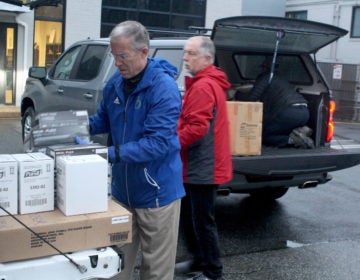
![CoronavirusPandemic_1024x512[1]](https://whyy.org/wp-content/uploads/2020/03/CoronavirusPandemic_1024x5121-300x150.jpg)
